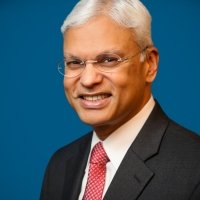Book Launch: Crouching Dragon, Hidden Tiger
The rise of the world's two most populated countries, India and China, is shifting global attention from the Atlantic to the Pacific. Author and journalist Prem Shankar Jha, in his new book, Crouching Dragon, Hidden Tiger, analyzes the Indian and Chinese economic and political systems with any eye to assessing the future development course of these two giants. At a 23 March 2010 launch of the new book at the Kissinger Institute, Jha set out his views; Evan Feigenbaum, Senior Fellow, Council of Foreign Relations; Chas Freeman, President, Middle East Policy Council; and Ashley Tellis, Senior Associate, Carnegie Endowment for International Peace, then offered comments.
A 2003 Goldman Sachs report, "Dreaming the BRICs: The Path to 2050," predicted that India and China soon will become the dominant suppliers for manufactured goods and services if, and only if, they are able to maintain political stability. This caveat precipitated Prem Shankar Jha's exploration of the subject. Is it safe to base policy on the assumption that India and China will dominate the global market by mid-century despite its contingency on political stability? While Jha concluded India and China will play a larger economic role in a more multi-polar world, he is skeptical they will dominate the world market – each for reasons of their own. His doubt centered on the difference between economic growth and economic development. China maintains economic growth yet struggles with economic development; India battles economic growth while enjoying economic development. Jha hypothesized both countries have mounting obstacles of their own to overcome before dominating the global economy, thus casting doubt on the Goldman Sachs report that this could occur around mid-century. What does this mean for the globe and the United States? Ashley Tellis opined that at an abstract level, China has the capability to set, make, and achieve national goals. However, there exists an internal struggle between the central and local governments. This conflict between the center and locality leads to poor state investment choices, damages growth and dilutes sustainability. Similarly, India faces capacity limitations; however, of a different kind. Likewise, the United States is weakened by such forces as interest groups but unlike India and China, the U.S. has greater latitude for making poor decisions and a higher tolerance for making mistakes already built into the system. Tellis predicted China will sustain peak performance for some time for various reasons including its low development base but that the Chinese are more susceptible to shocks in the system. India, on the other hand, will experience lower levels of peak performance but ironically this makes it less susceptible to shocks.
While Chas Freeman commended the similarities and linkages drawn between India and China in the book, he thought it overlooked the significance of overseas Chinese and Indians in the economic development of both countries. Ethnic Chinese and Indians from around the world have played a tremendous role by returning to their ethnic homes to invest capital and spur change and growth. Freeman also expressed less concern about India and China dominating the world as he did about a potential regional conflict between sparked by tension between the two countries, but perhaps also drawing in Japan, Russia, and Pakistan because of their ties to the two.
Evan Feigenbaum focused on three major points: institutions, social transitions, and geopolitical relevance. In examining political institutions, he compared the federalism of India to the federalism of China and concluded the institutions in both countries to be brittle and challenged by social transitions. He opined China is ahead of India in social transitions. Geopolitically, Feigenbaum hypothesized that, although India and China will not dominate the world, the international system will have to accommodate them. These institutions will undergo restructuring that will ultimately hurt Europe. Such changes are already taking place such as the transition from the G-8 to the G-20. Ultimately, there are great uncertainties regarding the impact of India and China's emergence as significant actors in world institutions.
Speakers


Hosted By

Kissinger Institute on China and the United States
The Kissinger Institute works to ensure that China policy serves American long-term interests and is founded in understanding of historical and cultural factors in bilateral relations and in accurate assessment of the aspirations of China’s government and people. Read more
